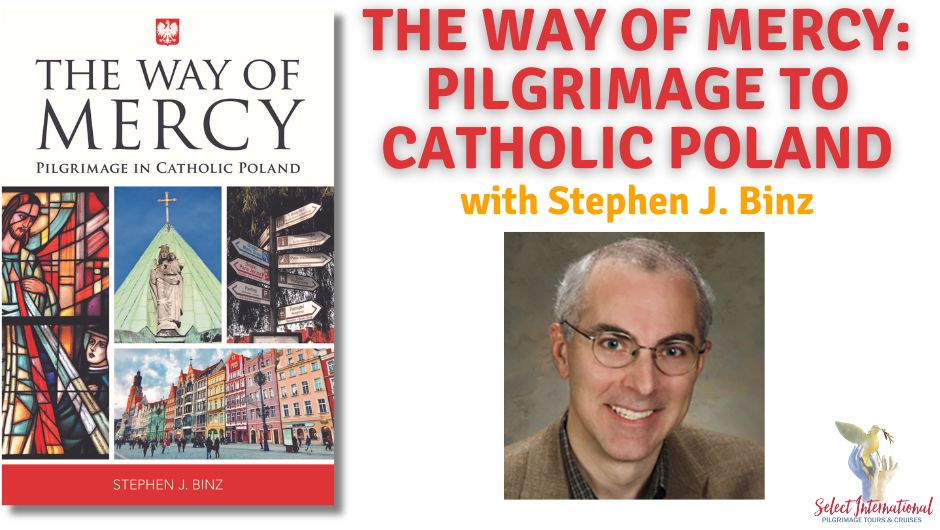
Aside from being a prolific author, Stephen J. Binz is a seasoned pilgrimage leader. He has now led dozens of trips with Select International Tours, and his pilgrims consistently return with high praise for the care and attention he gives to all who travel with him. His knowledge and experience of the Catholic faith and its Saints and sites are truly amazing.
We recently had the opportunity to speak with Stephen about his most recent book: The Way of Mercy: Pilgrimage in Catholic Poland, which just won Second Place for Pilgrimage/Catholic Travel at the Catholic Media Association awards event. It is available now, just click HERE.
Stephen, you have been leading pilgrimages for some time, but only recently to Poland. What drew you to travel there when there are so many other Catholic sites for pilgrims to visit?
I led my first pilgrimage to Poland in 2016, the Jubilee Year of Mercy. After first going there with a Jewish survivor of Auschwitz a couple of years before, I realized the deep suffering that pervades the history of Poland. But during the Year of Mercy, I realized that a golden thread of divine mercy is woven through the fabric of Poland’s history. Its heritage of suffering, compassion, courage, deep faith, and trust in God makes it a wonderful place to encounter God’s mercy. When I bring people there, they marvel at the many churches and deep religious devotion. Poland is filled with the legacy of its saints—but it’s a kind of heroic sanctity. It seems to me that the special mission of the Polish Church is to be the bearer of the grace of divine mercy for our times.
Poland has faced some tremendous, and often horrific, challenges throughout its history, including many in the twentieth century; how have those challenges affected the faith of those living there?
The twentieth century was certainly filled with terrible trials for the people of Poland. During the Second World War, they were attacked by the Nazis from the West and the Soviets from the East, suffering far more than any other nation. Then they were occupied and oppressed by Communism for most of the remainder of the century. But out of that terrible suffering has come remarkable sanctity. During those dark decades arose the witness of great saints like Faustina Kowalska, Maximillian Kolbe, and Pope John Paul II. The trials of the Polish people throughout the 20th century made Poland the martyr of the nations, or in St. John Paul’s words, the “Golgotha of the modern world.”
Besides the best-known, like Pope St. John Paul II and St. Maximillian Kolbe, there are many other less modern Polish saints. Who else stands out to you, having traveled there multiple times?
As I’ve explored Catholic Poland, I’ve come to realize that the sanctity of the last century was only possible because of the rich Christian tradition of over a thousand years in Poland. The patron saints of Poland, like St. Wojciech, St. Stanisław, and St. Jadwiga, are the sturdy pillars supporting the Church of Poland through the ages. The churches of Poland across the country enshrine the memories of that remarkable cloud of witnesses — the martyrs, bishops, confessors, and holy ones — that has sustained the faith of Poland throughout its history. Two of my favorites have recently been beatified by the Church. The first is Blessed Cardinal Stefan Wyszynski, whose biography is fascinating, leading Poland through the fire of totalitarian rule with his courageous faith. The other is Blessed Jerzy Popiełuszko, the heroic martyr of Solidarity whose witness inspired the people to overthrow their oppressors.
Poland has a very high percentage of Catholics per capita. Why is that? And is it evident when traveling there?
Historically, the spread of the Church resulted in several countries becoming predominantly Catholic, like Slovakia, Slovenia, Croatia, and Poland. The people of Poland treasure their Catholic faith because it has been with them through centuries of ordeal. And through it all, Poland has earned the title “Semper Fidelis”, ever faithful. The Catholic Church has maintained the rich culture of Poland through centuries of invasion and occupation. And yes, Catholicism remains alive in Poland: its churches are full, its cemeteries are honored, and its devotion is palpable.
In your book, you say, “Going on pilgrimage is a calling.” Can you elaborate on that? And how can people discern such a calling?
Yes, after leading pilgrimages for many years and hearing about what steers people to go, I believe it is a kind of “calling.” A call from God is experienced as a deep desire, whether that calling is a momentary urge or a lifelong vocation. For anyone is experiencing such a pressing desire, it’s important to explore its sources and to consider ways to realize it. People tell me, for example, that they’ve wanted to go to a particular sacred place their whole lives, but that recently that desire has become more intense and tangible. I tell them that they might be experiencing God’s call, and that now it is up to them to determine if God is clearing their path by giving them the right circumstances, the ability to sacrifice what it takes from their savings, and the space away from their ordinary responsibilities to make the trip. If these things all become possible, then that’s a sure lead. As people depart on pilgrimage, I invite them to consider how God has made this trip possible for them, who is sacrificing for their sake, and how all the pieces have fallen into place for this moment. Then I urge them to be grateful, relax, and follow God’s lead along the journey.
To further explore the unique opportunities of pilgrimage in Catholic Poland, take a look at this article, also by Stephen J. Binz: https://www.thedivinemercy.org/articles/be-pilgrim-catholic-poland
To see upcoming pilgrimages of Stephen J. Binz to Poland and other sacred sites, along with comments from recent travelers, see his website here: https://www.bridge-b.com/pilgrimage

About the Author
Stephen J. Binz is a biblical scholar, sought-after speaker, and author of Saint Junipero Serra’s Camino: A Pilgrimage Guide to the California Missions (Franciscan Media). He leads pilgrimages to biblical sites and sacred places throughout the world. For information about his publications, speaking topics, and pilgrimages, go to his website at Bridge-B.com.
